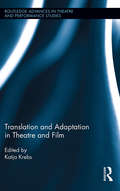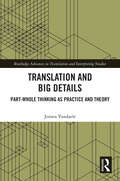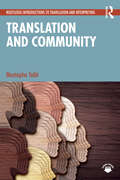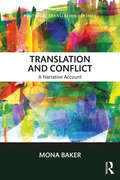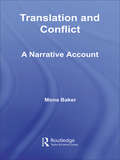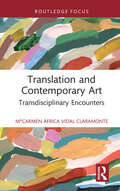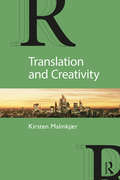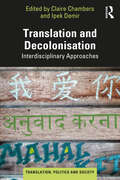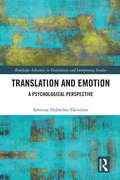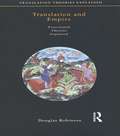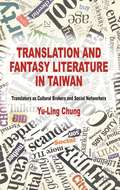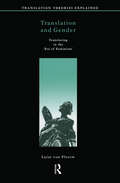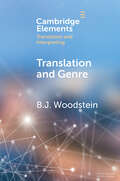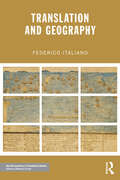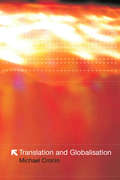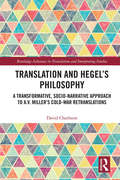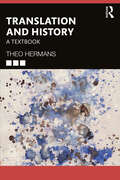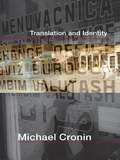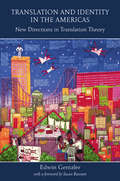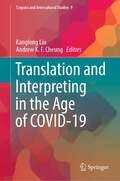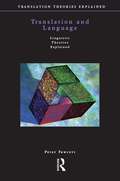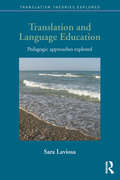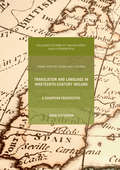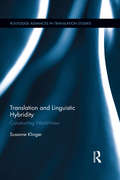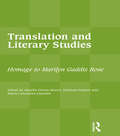- Table View
- List View
Translation and Adaptation in Theatre and Film (Routledge Advances in Theatre & Performance Studies)
by Katja KrebsThis book provides a pioneering and provocative exploration of the rich synergies between adaptation studies and translation studies and is the first genuine attempt to discuss the rather loose usage of the concepts of translation and adaptation in terms of theatre and film. At the heart of this collection is the proposition that translation studies and adaptation studies have much to offer each other in practical and theoretical terms and can no longer exist independently from one another. As a result, it generates productive ideas within the contact zone between these two fields of study, both through new theoretical paradigms and detailed case studies. Such closely intertwined areas as translation and adaptation need to encounter each other’s methodologies and perspectives in order to develop ever more rigorous approaches to the study of adaptation and translation phenomena, challenging current assumptions and prejudices in terms of both. The book includes contributions as diverse yet interrelated as Bakhtin’s notion of translation and adaptation, Bollywood adaptations of Shakespeare’s Othello, and an analysis of performance practice, itself arguably an adaptive practice, which uses a variety of languages from English and Greek to British and International Sign-Language. As translation and adaptation practices are an integral part of global cultural and political activities and agendas, it is ever more important to study such occurrences of rewriting and reshaping. By exploring and investigating interdisciplinary and cross-cultural perspectives and approaches, this volume investigates the impact such occurrences of rewriting have on the constructions and experiences of cultures while at the same time developing a rigorous methodological framework which will form the basis of future scholarship on performance and film, translation and adaptation.
Translation and Big Details: Part-Whole Thinking as Practice and Theory (Routledge Advances in Translation and Interpreting Studies)
by Jeroen VandaeleIn the age of big data, evidence keeps suggesting that small, elusive and infrequent details make all the difference in our appreciation of humanistic texts—film, fiction, and philosophy. This book argues, from a cross-disciplinary perspective, that expertise in humanistic translation is precisely the capacity to capture those details that are bigger than they seem. In humanistic translation, the expert handling of big details usually serves audiences and the original, but mala fide translation also works the details for subtle manipulation and audience deception. A focus on textual detail is therefore characteristic of humanistic translators but also compatible with central claims of the cultural turn in translation studies. This book, written by a scholar and teacher of literary, essayistic, and audiovisual translation, endeavors to articulate a seemingly dual interest—on textual detail and cultural analysis—as a single one. It theorizes connections between micro and macro analysis, between translation as detail and translation as culture, thus hoping to build bridges between humanistic translators and translation scholars. It acknowledges tensions between practice and theory and proposes a way forward: practitioners and scholars share ways of thinking—varieties of "part-whole thinking"—that machines can never acquire.
Translation and Community (Routledge Introductions to Translation and Interpreting)
by Mustapha TaibiCommunity, or public service, translation contributes to a more equitable and sustainable community by empowering minority groups such as migrants and refugees and is a growing area for both teaching and research within translation studies.Written by a leading authority with over 20 years of teaching experience and in consultation with a range of academics running major courses across the globe, this is the first accessible and interactive introductory textbook to this growing area. It provides step-by-step guidance to students undertaking an undergraduate or postgraduate course covering community translation, public service translation, translation as social action or translation as a social service in multilingual and multicultural societies. The book covers key issues in this area of translation practice, including its distinctive features, challenges and requirements, role and ethical issues, common text types, translation strategies, translation revision and quality assurance and relationships with end users.Including examples of a range of different text types, suggested activities and readings at the end of each chapter and additional resources and activities on the Routledge Translation Studies portal, this is the essential introduction for all students of community and public service translation.
Translation and Conflict: A narrative account (Routledge Translation Classics)
by Mona BakerTranslation and Conflict was the first book to demonstrate that translators and interpreters participate in circulating as well as resisting the narratives that create the intellectual and moral environment for violent conflict and social tensions. Drawing on narrative theory and with numerous examples from historical and current contexts of conflict, Mona Baker provides an original and coherent model of analysis that pays equal attention to the circulation of narratives in translation and to questions of dominance and resistance. With a new preface by Sue-Ann Harding, Translation and Conflict is more than ever the essential text for any student or researcher interested in the study of translation and social movements.
Translation and Conflict: A Narrative Account (Routledge Translation Classics Ser.)
by Mona BakerTranslation and Conflict demonstrates that translators and interpreters participate in circulating as well as resisting the narratives that create the intellectual and moral environment for violent conflict. Drawing on narrative theory and using numerous examples from historical and contemporary conflicts, the author provides an original and coherent model of analysis that pays equal attention to micro and macro aspects of the circulation of narratives in translation, to translation and interpreting, and to questions of dominance and resistance. The study is particularly significant at this juncture of history, with the increased interest in the positioning of translators in politically sensitive contexts, the growing concern with translators’ and interpreters’ divided loyalties in settings such as Guantanamo, Iraq, Kosovo, and other arenas of conflict, and the emergence of several activist communities of translators and interpreters with highly politicized agendas of their own, including Babels, Translators for Peace, Tlaxcala and ECOS. Including further reading suggestions at the end of each chapter, Translation and Conflict will be of interest to students of translation, intercultural studies and sociology as well as the reader interested in the study of social and political movements.
Translation and Contemporary Art: Transdisciplinary Encounters
by MªCarmen África Vidal ClaramonteThis book looks to expand the definition of translation in line with Susan Bassnett and David Johnston’s notion of the “outward turn”, applying this perspective to contemporary art to broaden the scope of how we understand translation in today’s global multisemiotic world. The book takes as its point of departure the idea that texts are comprised of not only words but other semiotic systems and therefore expanding our notions of both language and translation can better equip us to translate stories told via non-traditional means in novel ways. While the “outward turn” has been analyzed in literature, Vidal directs this spotlight to contemporary art, a field which has already engaged in disciplinary connections with Translation Studies. The volume highlights how the unpacking of such connections between disciplines encourages engagement with contemporary social issues, around identity, power, migration, and globalization, and in turn, new ways of thinking and bringing about wider cultural change. This innovative book will be of interest to scholars in translation studies and contemporary art.
Translation and Creativity
by Kirsten MalmkjærKirsten Malmkjær argues that translating can and should be considered a valuable art form. Examining notions of creativity and their relationship with translation and focusing on how the originality of translation is manifest in texts, the author explores a range of texts and their translations, in order to illustrate original as opposed to derivative translation. With reference to thirty translators’ discourses on their source texts and the author’s own experience of translating a short text, Malmkjær explores the theory of creativity, philosophical aesthetics, the philosophy of language, experimental and theoretical translation studies, and translators’ discourses on their work. Showing the relevance of these varied topics to the study of translating and translations underlines their complexity and the immensity of understanding that is regularly invested in translations. This work proposes a complete rethinking of the concepts of creativity and originality, as applied to translation, and is vital reading for advanced students and researchers in translation studies and comparative literature.
Translation and Decolonisation: Interdisciplinary Approaches (Translation, Politics and Society)
by Claire Chambers Ipek DemirTranslation and Decolonisation: Interdisciplinary Approaches offers compelling explorations of the pivotal role that translation plays in the complex and necessarily incomplete process of decolonisation. In a world where translation has historically been a tool of empire and colonisation, this collection shines the spotlight on the potential for translation to be a driving force in decolonial resistance. The book bridges the divide between translation studies and the decolonial turn in the social sciences and humanities, revealing the ways in which translation can challenge colonial imaginaries, institutions, and practice, and how translation opens up South-to-South conversations. It brings together scholars from diverse disciplines and fields, including sociology, literature, languages, migration, politics, anthropology, and more, offering interdisciplinary approaches and perspectives. By examining both the theoretical and practical aspects of this intersection, the chapters of this agenda-setting collection explore the impact of translation on decolonisation and highlight the need to decolonise translation studies itself. The book illuminates the transformative power of translation in transcending linguistic, cultural, and political boundaries.
Translation and Emotion: A Psychological Perspective (Routledge Advances in Translation and Interpreting Studies)
by Séverine Hubscher-DavidsonThis volume tackles one of the most promising and interdisciplinary developments in modern Translation Studies: the psychology of translation. It applies the scientific study of emotion to the study of translation and translators in order to shed light on how emotions can impact decision-making and problem-solving when translating. The book offers a new critical approach to the study of emotion in translation by analysing translators' accounts of their experiences, as well as drawing on a case study of emotional intelligence involving 155 professional translators. The author identifies three distinctive areas where emotions influence translators: emotional material contained in source texts, their own emotions, and the emotions of source and target readers. In order to explore the relevance and influence of emotions in translation, each chapter focuses on a different emotion trait: emotion perception, emotion regulation, and emotion expression.
Translation and Empire (Translation Theories Explored)
by Douglas RobinsonArising from cultural anthropology in the late 1980s and early 1990s, postcolonial translation theory is based on the observation that translation has often served as an important channel of empire. Douglas Robinson begins with a general presentation of postcolonial theory, examines current theories of the power differentials that control what gets translated and how, and traces the historical development of postcolonial thought about translation. He also explores the negative and positive impact of translation in the postcolonial context, reviewing various critiques of postcolonial translation theory and providing a glossary of key words. The result is a clear and useful guide to some of the most complex and critical issues in contemporary translation studies.
Translation And Fantasy Literature In Taiwan
by Yu-Ling ChungThis book examines the rise in popularity of fantasy literature in Taiwan and the crucial but often invisible role that translators have played in making this genre widely available. Topics covered include global fantasy fever, Chinese fantasy, game industry, the social status of translators, and the sociological direction of translations studies.
Translation and Gender: Translating in the 'Era of Feminism' (Translation Theories Explored #Vol. 2)
by Luise Von FlotowThe last thirty years of intellectual and artistic creativity in the 20th century have been marked by gender issues. Translation practice, translation theory and translation criticism have also been powerfully affected by the focus on gender. As a result of feminist praxis and criticism and the simultaneous emphasis on culture in translation studies, translation has become an important site for the exploration of the cultural impact of gender and the gender-specific influence of cuture. With the dismantling of 'universal' meaning and the struggle for women's visibility in feminist work, and with the interest in translation as a visible factor in cultural exchange, the linking of gender and translation has created fertile ground for explorations of influence in writing, rewriting and reading. Translation and Gender places recent work in translation against the background of the women's movement and its critique of 'patriarchal' language. It explains translation practices derived from experimental feminist writing, the development of openly interventionist translation strategies, the initiative to retranslate fundamental texts such as the Bible, translating as a way of recuperating writings 'lost' in patriarchy, and translation history as a means of focusing on women translators of the past.
Translation and Genre (Elements in Translation and Interpreting)
by B. J. WoodsteinWhat is a genre? How do genres differ between cultures and languages? How do generic texts get translated, and how does the specific genre affect the act of translation? This Element surveys the concept of genre itself, a number of different genres, and what happens to these genres through translation, while also providing an overview of research into these topics along with research-based approaches for translating work that can perhaps be labelled as generic.
Translation and Geography: Negotiation And Transmediation Of Western Spatial Imaginations (New Perspectives in Translation and Interpreting Studies)
by Federico ItalianoTranslation and Geography investigates how translation has radically shaped the way the West has mapped the world. Groundbreaking in its approach and relevant across a range of disciplines from translation studies and comparative literature to geography and history, this book makes a compelling case for a form of cultural translation that reframes the contributions of language-based translation analysis. Focusing on the different yet intertwined translation processes involved in the development of the Western spatial imaginary, Federico Italiano examines a series of literary works and their translations across languages, media, and epochs, encompassing: poems travel narratives nautical fictions colonial discourse exilic visions. Drawing on case studies and readings ranging from the Latin of the Middle Ages to twentieth-century Latin American poetry, this is key reading for translation theory and comparative/world literature courses.
Translation and Globalization
by Michael CroninTranslation and Globalization is essential reading for anyone with an interest in translation, or a concern for the future of our world's languages and cultures. This is a critical exploration of the ways in which radical changes to the world economy have affected contemporary translation.The Internet, new technology, machine translation and the emergence of a worldwide, multi-million dollar translation industry have dramatically altered the complex relationship between translators, language and power. In this book, Michael Cronin looks at the changing geography of translation practice and offers new ways of understanding the role of the translator in globalized societies and economies. Drawing on examples and case-studies from Europe, Africa, Asia, and the Americas, the author argues that translation is central to debates about language and cultural identity, and shows why consideration of the role of translation and translators is a necessary part of safeguarding and promoting linguistic and cultural diversity.
Translation and Hegel's Philosophy: A Socio-Narrative Approach to A.V. Miller's ‘Cold-War’ Retranslations (Routledge Advances in Translation and Interpreting Studies)
by David CharlstonThis volume engages with translations of philosophy as complex, socially structured narratives bound by emotional, political and philosophical connections, exploring these dynamics at work in A.V. Miller’s Hegel translations and retranslations published between 1969 and 1986. The book contextualises Miller’s lifelong commitment to Hegel and builds on this narrative to lay the foundations for its socio-narrative, Bourdieusian and feminist theoretical frameworks, applied to the texts and paratexts of Miller’s six retranslations. The volume’s plurifocal sociological approach both illuminates the role of translators and publishers of philosophy in the "great transformation" of political liberalism and subsequently seeks to transform understanding about the ethical responsibilities of translators of philosophy in communicating values of diversity and change in political thinking. In highlighting the value of sociologically-grounded analyses of translations of philosophical works, this book is key reading for students and scholars in translation studies, German studies, continental and feminist-informed philosophies.
Translation and History: A Textbook
by Theo HermansThis concise and accessible textbook is a comprehensive introduction to the key historical aspects of translation. Six chapters cover essential concepts in researching and writing the history of translation and translation as history. Theo Hermans presents and explains fundamental issues and questions in a clear and lively style. He includes numerous examples and case studies and offers suggestions for further reading. Four of the six chapters take their cue from ideas about historiography that are alive among professional historians. They pay attention to the role of narrative, to the emergence of transnational, transcultural, global and entangled history, and to particular fields such as the history of concepts and memory studies. Other topics include microhistory, actor–network theory and book history. With an emphasis on methodology, how to do research in translation history and how to write it up, this is an essential text for all courses on translation history and will be of interest to anyone working in translation theory and methodology.
Translation and Identity
by Michael CroninMichael Cronin looks at how translation has played a crucial role in shaping debates about identity, language and cultural survival in the past and in the present. He explores how everything from the impact of migration on the curricula for national literature courses, to the way in which nations wage war in the modern era is bound up with urgent questions of translation and identity. Examining translation practices and experiences across continents to show how translation is an integral part of how cultures are evolving, the volume presents new perspectives on how translation can be a powerful tool in enhancing difference and promoting intercultural dialogue. Drawing on a wide range of materials from official government reports to Shakespearean drama and Hollywood films, Cronin demonstrates how translation is central to any proper understanding of how cultural identity has emerged in human history, and suggests an innovative and positive vision of how translation can be used to deal with one of the most salient issues in an increasingly borderless world.
Translation and Identity in the Americas: New Directions in Translation Theory
by Edwin GentzlerTranslation is a highly contested site in the Americas where different groups, often with competing literary or political interests, vie for space and approval. In its survey of these multiple and competing groups and its study of the geographic, socio-political and cultural aspects of translation, Edwin Gentzler’s book demonstrates that the Americas are a fruitful terrain for the field of translation studies. Building on research from a variety of disciplines including cultural studies, linguistics, feminism and ethnic studies and including case studies from Brazil, Canada and the Caribbean, this book shows that translation is one of the primary means by which a culture is constructed: translation in the Americas is less something that happens between separate and distinct cultures and more something that is capable of establishing those very cultures. Using a variety of texts and addressing minority and oppressed groups within cultures, Translation and Identity in the Americas highlights by example the cultural role translation policies play in a discriminatory process: the consequences of which can be social marginalization, loss of identity and psychological trauma. Translation and Identity the Americas will be critical reading for students and scholars of Translation Studies, Comparative Literature and Cultural Studies.
Translation and Interpreting in the Age of COVID-19 (Corpora and Intercultural Studies #9)
by Kanglong Liu Andrew K. F. CheungThis book presents the latest developments in translation and interpreting (T&I), which has been at the forefront to face the challenges brought by COVID-19. The contributions in the book contain both quantitative and qualitative empirical studies as well as personal accounts of the impact and opportunities T&I has faced in the global pandemic, covering topics including metaphor translation, delivery of and access to T&I services during COVID-19, renewed perspectives on T&I practice and profession, and technological applications in the T&I classroom. The various themes in the book, through examining the role and many facets of T&I against the backdrop of COVID-19, have demonstrated that T&I as a vital means of intercultural communication is assuming immense importance at a time of uncertainties and disruptions.As one of the books addressing crucial issues of T&I at a time of global crisis, this edited book is of interest to many T&I professionals, researchers, teachers, and students who have been impacted by the pandemic and yet showed a continued interest in T&I and its future emerging practice in the post-pandemic era.
Translation and Language (Translation Theories Explored)
by Peter FawcettTranslation Studies and linguistics have been going through a love-hate relationship since the 1950s. This book assesses both sides of the relationship, tracing the very real contributions that linguists have made to translation studies and at the same time recognizing the limitations of many of their approaches. With good humour and evenhandedness, Fawcett describes detailed taxonomies of translation strategies and deals with traditional problems such as equivalence. Yet he also explains and assesses the more recent contributions of text linguistics, sociolinguistics, pragmatics and psycholinguistics. This work is exceptional in that it presents theories originally produced in Russian, German, French and Spanish as well as English. Its broad coverage and accessible treatment provide essential background reading for students of translation at all levels.
Translation and Language Education: Pedagogic Approaches Explored (Translation Theories Explored)
by Sara LaviosaThe revival of translation as a means of learning and teaching a foreign language and as a skill in its own right is occurring at both undergraduate and postgraduate levels in universities. In this book, Sara Laviosa proposes a translation-based pedagogy that is grounded in theory and has been applied in real educational contexts. This volume draws on the convergence between the view of language and translation embraced by ecologically-oriented educationalists and the theoretical underpinnings of the holistic approach to translating culture. It puts forward a holistic pedagogy that harmonizes the teaching of language and translation in the same learning environment. The author examines the changing nature of the role of pedagogic translation starting with the Grammar Translation Method and concluding with the more recent ecological approaches to Foreign Language Education. Translation and Language Education analyses current research into the revival of translation in language teaching and is vital reading for translators, language teachers and postgraduate students working in the areas of Translation Studies and Applied Linguistics.
Translation and Language in Nineteenth-Century Ireland
by Anne O’connorThis book will provide an in-depth study of translation and translators in nineteenth-century Ireland and will use translation history to widen our understanding of cultural exchange in this period, creating new perspectives on historical, political and cultural debates of the era.
Translation and Linguistic Hybridity: Constructing World-View (Routledge Advances in Translation and Interpreting Studies)
by Susanne KlingerThis volume outlines a new approach to the study of linguistic hybridity and its translation in cross-cultural writing. By building on concepts from narratology, cognitive poetics, stylistics, and film studies, it explores how linguistic hybridity contributes to the reader’s construction of the textual agents’ world-view and how it can be exploited in order to encourage the reader to empathise with one world-view rather than another and, consequently, how translation shifts in linguistic hybridity can affect the world-view that the reader constructs. Linguistic hybridity is a hallmark of cross-cultural texts such as postcolonial, migrant and travel writing as source and target language come into contact not only during the process of writing these texts, but also often in the (fictional or non-fictional) story-world. Hence, translation is frequently not only the medium, but also the object of representation. By focussing on the relation between medium and object of representation, the book complements existing research that so far has neglected this aspect. The book thus not only contributes to current scholarly debates – within and beyond the discipline of translation studies – concerned with cross-cultural writing and linguistic hybridity, but also adds to the growing body of translation studies research concerned with questions of voice and point of view.
Translation and Literary Studies: Homage to Marilyn Gaddis Rose
by Deborah Folaron Marella Feltrin-Morris María Constanza GuzmánBy nature a transdisciplinary area of inquiry, translation lends itself to being investigated at its intersection with other fields of study. Translation and Literary Studies seeks to highlight the manifold connections between translation and notions of gender, dialectics, agency, philosophy and power. The volume also offers a timely homage to renowned translation theorist Marilyn Gaddis Rose, who was at the forefront of the group of scholars who initiated and helped to institutionalize translation studies. Inspired by Gaddis Rose’s work, and particularly by her concept of stereoscopic reading, the volume is dynamically complementary to the burgeoning contemporary field of global comparative literature, underscoring the diversity of critical literary thought and theory worldwide. Arranged thematically around questions of translation as literary and cultural criticism, as epistemology, and as poetics and politics, and dealing with works within and beyond the Western tradition, the essays in the volume illustrate the multi-voiced spectrum of literary translation studies today.
